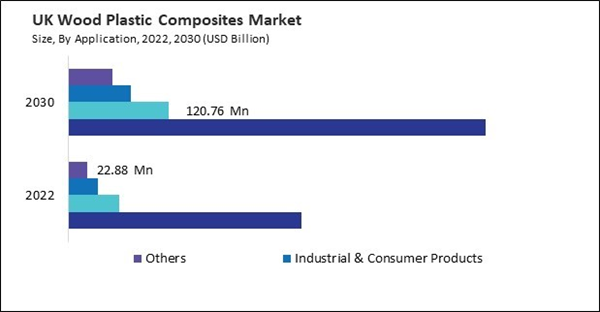Polyvinylchloride (PVC) is a key component in the wood plastic composites (WPC) market, offering versatility and performance benefits. PVC is often used as a thermoplastic polymer in WPC production, serving as a binding agent that holds together the wood fibers or flour. Its excellent weatherability, resistance to moisture, and low maintenance requirements make it a popular choice for outdoor applications like decking, fencing, and railing systems. PVC also enhances the dimensional stability of WPC products, reducing swelling and warping over time. Therefore, the Germany market utilized 59.2 kilo tonnes of PVC in 2022.
The Germany market dominated the Europe Wood Plastic Composites Market, by Country in 2022, and would continue to be a dominant market till 2030; thereby, achieving a market value of $884.7 Million by 2030. The UK market is exhibiting a CAGR of 8.3% during (2023 - 2030). Additionally, The France market would experience a CAGR of 10.1% during (2023 - 2030).
Innovations in WPC are driving product development, performance enhancement, and market competitiveness. These innovations encompass various aspects of material formulation, processing techniques, and application engineering. Innovations in sustainable material sourcing involve using recycled or reclaimed wood fibers, agricultural residues, and post-consumer plastics as feedstocks for WPC production. By repurposing waste materials and reducing reliance on virgin resources, manufacturers enhance the sustainability credentials of WPCs and minimize environmental impact.
Advancements in additives and formulations contribute to improved performance characteristics and durability of WPCs. Innovations in coupling agents, UV stabilizers, antioxidants, and lubricants enhance moisture resistance, weatherability, color retention, and mechanical properties, resulting in WPCs with enhanced longevity and performance in challenging environments. Antioxidants are additives that inhibit the oxidation and degradation of polymer matrices in WPCs, protecting against thermal degradation, hydrolysis, and oxidative aging.
Italy is recognized for its automotive design and craftsmanship expertise, focusing on aesthetics, style, and luxury. As per the data from the International Trade Administration, the latest available data (December 2022) show that in 2022, the automotive sector’s turnover was €92.7 billion, which was 9.3% of Italy’s manufacturing turnover and 5.2% of Italy’s GDP. In 2022, 782,629 vehicles (486,111 cars, 234,798 light commercial vehicles, and 61,720 trucks and buses) were produced in Italy. 1,335,487 new cars, 9.5% fewer than in the prior year, were registered in 2022. Hence, the rising construction and automotive sector in Europe will boost the growth of the market in the region.
Based on Type, the market is segmented into Polyethylene, Polyvinyl Chloride, Polypropylene and Others. Based on Application, the market is segmented into Building & Construction, Automotive Components, Industrial & Consumer Products and Others. Based on countries, the market is segmented into Germany, UK, France, Russia, Spain, Italy, and Rest of Europe.
List of Key Companies Profiled
- Trex Company, Inc.
- The AZEK Company Inc. (TimberTech)
- Fortune Brands Innovations, Inc.
- Dow, Inc.
- UFP Industries, Inc.
- Renolit SE
- AIMPLAS
- JELU-WERK J. Ehrler GmbH & Co. KG
- FKuR Kunststoff GmbH
- Beologic
Market Report Segmentation
By Type (Volume, kilo Tonnes, USD Billion, 2019-2030)- Polyethylene
- Polyvinyl Chloride
- Polypropylene
- Others
- Building & Construction
- Automotive Components
- Industrial & Consumer Products
- Others
- Germany
- UK
- France
- Russia
- Spain
- Italy
- Rest of Europe
Table of Contents
Companies Mentioned
- Trex Company, Inc.
- The AZEK Company Inc. (TimberTech)
- Fortune Brands Innovations, Inc.
- Dow, Inc.
- UFP Industries, Inc.
- Renolit SE
- AIMPLAS
- JELU-WERK J. Ehrler GmbH & Co. KG
- FKuR Kunststoff GmbH
- Beologic









